Police seize thousands of litres of ‘fake’ olive oil in raids
International gang allegedly sought to pass off lower-quality oils as virgin and extra virgin

Your support helps us to tell the story
From reproductive rights to climate change to Big Tech, The Independent is on the ground when the story is developing. Whether it's investigating the financials of Elon Musk's pro-Trump PAC or producing our latest documentary, 'The A Word', which shines a light on the American women fighting for reproductive rights, we know how important it is to parse out the facts from the messaging.
At such a critical moment in US history, we need reporters on the ground. Your donation allows us to keep sending journalists to speak to both sides of the story.
The Independent is trusted by Americans across the entire political spectrum. And unlike many other quality news outlets, we choose not to lock Americans out of our reporting and analysis with paywalls. We believe quality journalism should be available to everyone, paid for by those who can afford it.
Your support makes all the difference.Italian and Spanish police have arrested 11 people after breaking up an international gang allegedly passing off cheap olive oils as virgin and extra virgin.
A joint police operation between Spain’s Guardia Civil, Italy’s Carabinieri and Europol, seized more than 5,000 litres of adulterated oil, as well as four luxury cars and €91,000 (£78,000), following a raid on eight properties, including oil-bottling plants in three towns in central southern Spain.
The raids came after droughts and other adverse weather conditions in western Europe increased the cost of olive oil and drove a fall in global production for the second consecutive year.
In a statement, Europol said: “Unfortunately, the faking of extra virgin olive oil is a common practice. A mix of various factors, such as the general inflation of prices, reduced olive oil production and increasing demand, have created the perfect breeding ground for fraudulent producers.”
“Mixing consumer-grade olive oil with lower grade alternatives allowed the criminals to offer competitive prices while entering legal supply chains,” the statement added.
Global production is expected to fall to 2.4 million tonnes this year, according to the International Olive Council, well short of global demand of around 3 million tonnes.
The operation began after Spanish authorities discovered “a series of anomalies” while inspecting a lorry that was moving olive oil in the Cuided Real region, just south of Madrid.
The cooperation with Italian authorities began when the Spanish police uncovered a two-pronged operation designed to distribute adulterated olive oil on the global market.
“In Spain, they used a company that was linked to the acquisition of lower-category oils to make changes to cloudy and poor quality oils to turn them into virgin and extra virgin and then sell them by falsifying documents,” the authorities said in a statement.
“They mixed cloudy oils – a sub-product of the olive oil producing process – with better quality olive oil so as to obtain the correct levels of fats and [other substances] to allow them to be sold. They also impeded traceability by not registering their companies’ oils.”
The Italian authorities discovered a similar alleged operation involving two important oil-processing companies in Italy.
“Eight simultaneous searches were carried out in Spain and Italy and 11 people were arrested,” the statement said.
“As a result of the searches, more than 5,200 litres of market-ready, adulterated olive have been seized, along with €91,000 [£78,000] in cash and four high-end vehicles. A number of bank accounts have also been blocked.”
Heatwaves, with temperatures above 40C across Spain and other olive-producing countries such as Greece, Italy, Portugal, Turkey and Morocco, have made it increasingly difficult to protect the industry.
Spain, which produces half the world’s olive oil, is expected to produce 765,000 tonnes this year. That is more than the 664,000 produced in last year’s harvest but well short of the 1.3 million tonnes or so that could be counted on in previous years.
Join our commenting forum
Join thought-provoking conversations, follow other Independent readers and see their replies
Comments